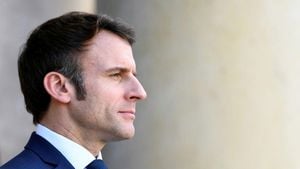The 2024 U.S. presidential election is shaping up to be a pivotal event, not just for American politics but for the progress of women across the nation and beyond. Insights from Prime Minister Justin Trudeau's recent address and various political movements provide a window to understand just how significant this period could be for women's rights.
Trudeau attended a gala for Equal Voice, aimed at embedding more women voices within political frameworks, where he expressed disappointment over Vice President Kamala Harris's loss to Donald Trump. Enunciated clearly was the sentiment shared by many activists: the election results might be seen as a setback for women’s rights and progress. "We were supposed to be on a steady, if difficult, march toward progress. And yet, just a few weeks ago, the United States voted for the second time to not elect its first woman president," remarked Trudeau.
His comments were underscored by the reality of increasing political volatility surrounding women's issues. Trudeau highlighted alarming incidents where political leaders are increasingly leaning toward regressive policies threatening women’s rights, often couching their opposition to issues like abortion rights under the guise of protecting family values. This intensified dialogue suggests women might face even steeper uphill battles if such trends continue following the election.
Canada’s currently progressive stance on women’s rights stands as an outlier against the burgeoning reactionary politics seen south of the border. Trudeau’s government has maintained female representation at the highest levels, with over half of his cabinet consisting of women, alongside significant policy changes like government-subsidized childcare and broader healthcare access including contraceptive care. These advances serve as meaningful contrasts to shifting dynamics observed during election cycles.
Across the Atlantic, strikes on women's rights by some political factions have sparked urgent conversations about governance and representation. Rising concern over retrogressive legislation encompassing issues like reproductive rights, equal pay, and violence against women highlights the New York Times' portrayal of election participation as being especially consequential this election season. Activists fear immense repercussions arising from anti-choice candidates gaining ground.
The stakes are undoubtedly high as data points to considerable shifts within policy perspectives potentially occurring, especially if Trump's political ideologies dominate following the upcoming electoral decisions. Advocacy groups stress the importance of voting, not only expecting candidates to support women's rights but also to enact policies reflecting these principles once elected.
Political leaders and civil society alike have amplified calls for action leading up to the election. Young leaders, particularly from Gen Z and millennials, are engaging more passionately than ever, advocating for change, which could lead to reshaping perceptions of women within leadership and various sectors. There’s palpable energy feeding from grassroots movements, ensuring the debates surrounding female rights aren't relegated to mere talking points, but revolve actively within community dialogues.
Organizations like Equal Voice are integral during this time, emphasizing the importance of women’s representation and participation. Reactions from various areas of the political spectrum indicate prevailing skepticism about whether leaders genuinely prioritize female perspectives or if they’re merely utilizing them as tactical instruments to garner votes.
The sentiment from Trudeau aligns with those concerned about the erosion of rights across this broad spectrum. Noticeably, figures like billionaire Elon Musk have attempted to dismiss Trudeau’s apprehensions contemporary to the election as irrelevant or exaggerated, creating friction among public figures. The pushback emphasizes how much the political discourse has shifted, where women's rights remain bargaining chips—at times becoming fodder for jest amid serious planetary consequences.
Emerging campaigns aiming to unite women voters collectively represent not just shared interests but heightened political awareness on long-contested human rights. This generalized realization facilitates broader discussions on equality, health care, and social justice, stirring momentum likely to extend beyond the electoral thresholds.
Moving forward, the challenge remains rooted deeply not only within the electoral processes but also intertwined with societal norms dictifying expected roles of women. Activists stress reaffirming personal agency over their bodies alongside reclaiming the narrative surrounding women’s empowerment. With the rise of alarming societal trends, progress could slip from secure grasp if vigilance fades; hence organizations championing women’s rights face heightened urgency to galvanize votes and commitments for significant movements.
Trump's candidacy, often criticized for being lackluster on pressing matters like women's rights, poses serious concerns. Should he raise to power again, it could alter existing frameworks substantially, leading to potential restrictions embodied within political ideologies opposed to serious engagement. Justice for women's rights necessitates collective advocacy pushing for policies fundamentally pro-women at every governance level.
The road is fraught with challenges, underscoring the need for sustained engagement from voters, particularly young women who will potentially shape the political demographic moving forward. Optimism exists alongside trepidation about the outcomes generated through the 2024 U.S. elections, where women manifesting their rightful power can truly galvanize the discourse.
Trudeau’s comments serve as both cautionary tales and powerful reflections of the sentiments shared by many as they eye the elections underlining both hope and growing concern. The future lies not solely within the ballots cast but distinctly within the voices uniting behind these pressing demands for fundamental rights advocated as being inherent. Therefore, illuminating the impact of these choices will resonate far beyond borders and reflect aspirations for equality even amid adversity.
Women across the board stand at pivotal junctions not just for themselves but for future generations, urging the active pursuit of policies ensuring their voices remain unshackled. With political possibilities at risk, how these elections play out will likely dictate tides of significant change within the realms of gender equality—a fundamental right once viewed as fringe now stands at the forefront of mainstream politics. The resilient fight navigates pushing forward through collective means and vehement assertions for equality, even as challenges loom large.
So as the dust settles post-election, one can hope for progress, yet remain prudent to stay alert for the tides may swing unexpectedly. The soul of democracy relies on safeguarding these rights, and the next steps hinge upon each of these choices voters make—loud and furious with intention, carving out space for women's progress and representation everywhere—or silent, which seldom yields tangible results.



